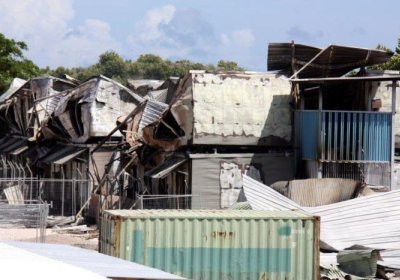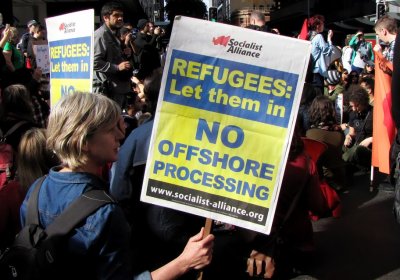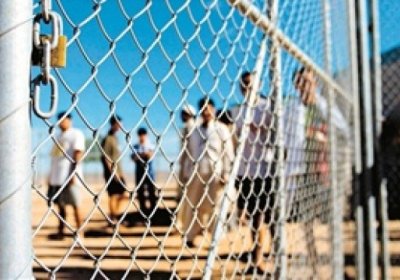Forty-eight hours to send newly arrived refugees back the way they came and a plan to conceal when boats are “turned around” at sea, were among immigration minister Scott Morrison's statements at his first weekly briefing under “Operation Sovereign Borders” on September 23.
Jay Fletcher
Just before the federal election that put Tony Abbott in power, his soon-to-be immigration minister Scott Morrison said the government may stop telling the public when asylum boats arrive in Australia.
Instead, reporting details about boat arrivals — including numbers on board, their nationalities and whether any are children — would be an “operational decision” of the defence officers in charge of the Coalition's “Operation Sovereign Borders”.
The two big parties have long considered refugees’ rights forfeit. This election year has been a time of unprecedented sacrifice of refugees, as each “policy” idea from Labor and the Liberals becomes more extreme than the last.
After signing up Papua New Guinea and Nauru to bogus resettlement deals, PM Kevin Rudd has most recently sent families to Nauru and continues to oversee legally dubious deportations.
It took a federal magistrate five minutes to dismiss charges against veteran unionist Bob Carnegie in a Brisbane courtroom on August 16.
Carnegie faced 18 charges related to contempt of court, which were pushed by anti-union building firm Abigroup.
Abigroup had accused Carnegie of defying court orders to avoid the site of a community picket that was campaigning for safety and conditions on behalf of the Construction Forestry Mining Energy Union and its workers.
Nauru's terrible poverty, stagnant economy and unstable administration has paved the way for its main aid-provider, the Australian government, to sign it up for a similar refugee “deal” as Papua New Guinea.
Australian Prime Minister Kevin Rudd announced that refugees who arrived in Australia by boat could be sent for processing and then would “settle and reside” on Nauru.
The so-called riot that burned down much of the Nauru detention camp began as a peaceful protest by refugees wanting their asylum processing to begin.
The July 19 protests by almost all of the 500 men held in the compound “was not borne out of malice,” the Salvation Army said in a statement on July 23.
“It was a build up of pressure and anxiety over 10 months of degrading treatment, and a planned peaceful protest that degenerated. It was a reaction to a refugee processing system that is devoid of logic and fairness.”
A Third World country suffering rising violence, rapes, political corruption and plagued by endemic diseases such as cholera and malaria will be the new dumping ground for Australia’s refugee arrivals.
Kevin Rudd’s July 19 announcement that Australia would immediately start sending all new boat arrivals to be detained, assessed and resettled by — or repatriated from — Papua New Guinea will lead to myriad human rights violations.
Prime Minister Kevin Rudd’s astounding announcement that all asylum seeker boat arrivals “from now on” would never be resettled in Australia and subject to a rigged offshore dumping deal with the Papua New Guinea government has shocked many.
Immigration minister Tony Burke also confirmed the Manus Island detention camp would be expanded to hold up to 3000 detainees, and would be brought “back up to standard” to again house women and children.
The refugee “debate” in Australian media and politics is rarely concerned about facts or evidence. Tony Abbott can call refugees “illegal” and be quoted uncritically in the news. Bob Carr can name himself a “humanitarian” in national media and keep a straight face.
Headlines like “Swamped by boatpeople” are so common that the public eye just glazes over and accepts it as the truth.
After fleeing and risking everything to seek asylum under Australia's laws, Iranian refugees now face being singled out and persecuted once again. This time, by the Australian Labor government.
New Prime Minister Kevin Rudd labelled “a whole bunch of people” as “economic migrants” who “comport as refugees”. Foreign affairs minister Bob Carr said boat arrivals are “increasingly not people fleeing persecution” because they are from “majority religious and ethnic groups”.
Nauru camp detainees have made allegations of brutal beatings by security guards, as newly leaked documents from the Salvation Army detailed the early “chaos” of the camp.
A protest of recent arrivals that began on June 25 was met with a violent crackdown by guards that reportedly left six Palestinian men unconscious.
The protesters were mostly Palestinian, Sudanese and Lebanese refugees. They had just learned from Australian officials that assessment of their claims for protection would be delayed.
A new website has published the biggest set of immigration detention records in Australia to date. It will provide unprecedented verification of the endemic self-harm and psychiatric crises that refugee rights campaigners have independently reported for years.
- Previous page
- Page 5
- Next page










